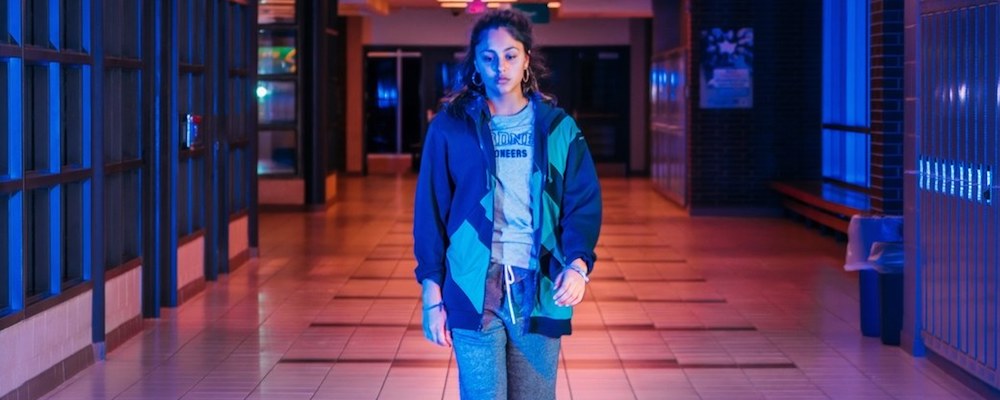‘Share’ Taps Into the Dark Reality of a Teen Girl’s Assault in the Digital Age
Alci Rengifo
HBO’s “Share” reflects rather darkly on the ways the digital age is affecting life for Gen Z. Our private lives are under the constant glare of smart phones and social media, including moments of abject humiliation. This new film by Pippa Bianco solemnly puts itself in the shoes of a teenager undergoing the ultimate nightmare of our time, namely having something horrible happen to her, in this case assault, on camera and then seeing it spread around. Bianco dramatized this kind of premise before in a 2015 short of the same name, but here has the space to turn it into an unnerving meditation.
Mandy (Rhianne Barreto) is an instantly recognizable high schooler in modern American suburbia. One night after a party she awakens on her front lawn. She goes about her daily routine, since drinking too much is part of the puberty experience. Mandy is on the school basketball team and maneuvers through the typical social structures of student life. Then the texts arrive, and a video of her the night of the party, splayed on the floor, being laughed at by male classmates. The video cuts before anything else happens and Mandy is internally wrecked by the question of what else took place that night. Making it worse is that the footage has been shared around. While friends feign sympathy, Mandy can’t get any straight answers even from the guys who were there like Dylan (Charlie Plummer) or A.J. (Nicholas Galitzine). When Mandy’s parents find out about the video they take action which results in her now feeling isolated from nearly everyone. It’s almost a Kafkaesque trial where Mandy would like to know what happened, but wonders if the social cost is worth it.
Gen Z’s combination of teenage debauchery with the rise of social media has fueled some of the best recent pop culture work on film and TV. Bianco is also a director on HBO’s feverish “Euphoria,” which is an even edgier panorama of contemporary teenage life. “Share” has that show’s same aesthetic, turning suburban streets and hangouts into neon-lit spaces where lonely teenagers and disturbed adults hide in the shadows. But Bianco isn’t going for the same kind of breakneck energy. This is instead a slow burner about the very mood of feeling entrapped while struggling with a hazy memory. Her screenplay and the editing technique of the movie feel disoriented, which is appropriate. It used to be that if you spiraled into smashed mode at a party the next morning regrets and anything else might be lost in the haze, today people are having their experiences under the gaze of iPhones. Youth’s unwise choices and hormonal urges can now be documented forever and used for blackmail or revenge. In its subtext “Share” is about what assault and harassment now mean in a digitized existence. Mandy might not recall exactly what happened, but the video of her on the floor, with guys appearing to pull at her pants suggest something did, and she feels deep down there should be consequences.
Bianco avoids some of the clichés you tend to find in these stories about the kids being bad in middle class USA. Mandy’s parents, Kerri (Poorna Jagannathan) and Mickey (J.C. MacKenzie) immediately get involved but don’t pass judgement on their daughter. Their frustrations and anger are centered on the fact that Mandy might have been taken advantage of, and it was then filmed for the whole world to see. Bianco’s writing has a searing honesty in a scene where Mandy breaks down, telling Mickey she likes to party and hook up with guys, so maybe she had this coming. Defying the usual movie dad code, Mickey just takes her hand and tells her that what she’s done by her own choice isn’t the issue, it’s what was done without her consent. We don’t see that often in films tackling the ethics of a fast-changing world. Dylan, as played by Charlie Plummer, who was so memorable in last year’s underrated “Lean on Pete,” seems like that one good guy in the group, the friend who is not a toxic “bro.” Then Bianco defies our expectations, posing challenging questions about trust. Mandy herself, played with a subdued naivety by British actress Rhianne Barreto, is not designed to inspire pity. She’s a kid trying to figure out a complicated, scarring situation. We all have those moments in life, but rarely are they shared without our permission.
Like HBO’s “Euphoria,” high school in “Share” has a tone even more ominous than what that crucible we all endure looked like in ’80s or ’90s films. Students sit in front of glowing computer screens as if in a dystopian future, privacy can be interrupted by texts bringing life-shaking news, hallways look lonely and cold. Bianco announces herself here as a director of tone and atmosphere.
“Share” avoids becoming a preachy message film. It’s a subdued, patient drama. Some of the best films about teenage life go beyond their target audience because we’ve all been through it, and in a globalized, digital environment we’re ever more connected. What happens to Mandy could happen to any adult anywhere too. It’s a new world now where both our best and worst are now available for everyone to see and carry in their pockets.
“Share” premieres July 27 at 10 p.m. ET on HBO.

